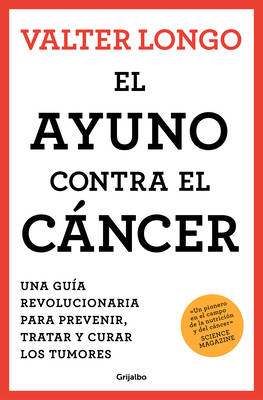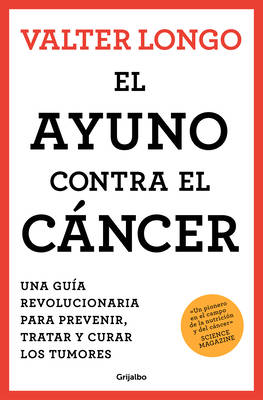
Je cadeautjes zeker op tijd in huis hebben voor de feestdagen? Kom langs in onze winkels en vind het perfecte geschenk!
- Afhalen na 1 uur in een winkel met voorraad
- Gratis thuislevering in België vanaf € 30
- Ruim aanbod met 7 miljoen producten
Je cadeautjes zeker op tijd in huis hebben voor de feestdagen? Kom langs in onze winkels en vind het perfecte geschenk!
- Afhalen na 1 uur in een winkel met voorraad
- Gratis thuislevering in België vanaf € 30
- Ruim aanbod met 7 miljoen producten
Zoeken
Omschrijving
MATAR DE HAMBRE AL CÁNCER, NUTRIR AL PACIENTE Cuando se habla del tratamiento del cáncer, Valter Longo, el experto mundial en la relación entre alimentación, longevidad y salud, cambia por completo el enfoque para complementar el tratamiento. Tras años de investigaciones y programas experimentales, el autor demuestra que la aplicación de protocolos controlados de ayuno es un aliado muy poderoso en la lucha contra varios tipos de tumores, y a partir de esa idea explora nuevas y posibles combinaciones con las terapias estándares. A pesar de los avances de la ciencia, casi una de cada dos personas corre hoy el riesgo de enfermar de cáncer. ¿Cómo es posible que hayamos logrado reducir la posibilidad de padecer enfermedades mortales como las cardiovasculares y muchas otras, y no hayamos obtenido un éxito parecido con el cáncer? La explicación la encontramos en el hecho de que los tumores son extremadamente complejos -ninguno es igual a otro- y están formados por células que no siguen un desarrollo previsible. Ahora bien, todos tienen algo en común: están hechos de células «confundidas y rebeldes» que comen mucho más que las sanas, sobre todo si se atacan con terapias convencionales. Según esta premisa, ayudar a prevenir, pero también a vencer, las enfermedades tumorales es posible haciendo que las células enfermas se mueran de hambre. Este libro abre una nueva vía para que el paciente se convierta en protagonista activo de su tratamiento y curación. ENGLISH DESCRIPTION STARVE CANCER TO DEATH. NURTURE THE PATIENT.
When speaking about cancer treatment, world expert in the links between diet, longevity, and health Valter Longo changes his approach entirely to complement the therapy. After years of research and experimental programs, the author proves that controlled fasting protocols are a very powerful ally in the fight against several kinds of tumors, and from that notion explores new and possible combinations of the standard treatment. Despite scientific advancements, almost one in every two people is at risk of developing cancer. How is it possible that we have managed to reduce the possibility of suffering mortal diseases, such as cardiovascular disease and others, but we haven't been equally successful regarding cancer? The explanation is that tumors are extremely complex--none identical to another--and are formed by cells that don't follow a foreseeable development pattern. Nevertheless, they all have something in common: they are made up of "confused, rebellious" cells that eat much more than healthy cells do, especially when attacked with conventional therapies. Following this premise, it is possible to help prevent, but also defeat tumoral diseases by starving the sick cells to death. This book opens a new pathway for the patient to become an active protagonist in his own treatment and health.
When speaking about cancer treatment, world expert in the links between diet, longevity, and health Valter Longo changes his approach entirely to complement the therapy. After years of research and experimental programs, the author proves that controlled fasting protocols are a very powerful ally in the fight against several kinds of tumors, and from that notion explores new and possible combinations of the standard treatment. Despite scientific advancements, almost one in every two people is at risk of developing cancer. How is it possible that we have managed to reduce the possibility of suffering mortal diseases, such as cardiovascular disease and others, but we haven't been equally successful regarding cancer? The explanation is that tumors are extremely complex--none identical to another--and are formed by cells that don't follow a foreseeable development pattern. Nevertheless, they all have something in common: they are made up of "confused, rebellious" cells that eat much more than healthy cells do, especially when attacked with conventional therapies. Following this premise, it is possible to help prevent, but also defeat tumoral diseases by starving the sick cells to death. This book opens a new pathway for the patient to become an active protagonist in his own treatment and health.
Specificaties
Betrokkenen
- Auteur(s):
- Vertaler(s):
- Uitgeverij:
Inhoud
- Aantal bladzijden:
- 528
- Taal:
- Spaans
Eigenschappen
- Productcode (EAN):
- 9788425361852
- Verschijningsdatum:
- 26/01/2023
- Uitvoering:
- Boek
- Formaat:
- Trade paperback (VS)
- Afmetingen:
- 1400 mm x 2150 mm
- Gewicht:
- 576 g

Alleen bij Standaard Boekhandel
+ 51 punten op je klantenkaart van Standaard Boekhandel
Beoordelingen
We publiceren alleen reviews die voldoen aan de voorwaarden voor reviews. Bekijk onze voorwaarden voor reviews.









